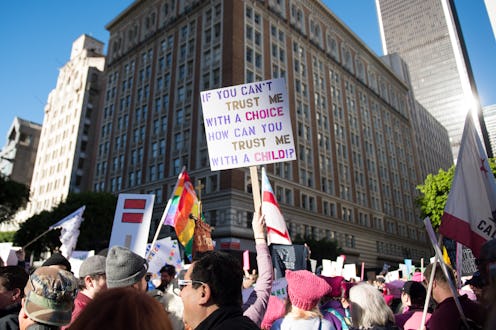News
The Women's March Just Launched Its Eighth Action

On Tuesday, the Women's March launched Action Eight of their 10 Actions/100 Days campaign. The latest step in its resistance playbook is titled, "Let's Talk: Why We Resist." On the Women's March website, the plan is laid out in simple terms, but it may well turn out to be one of the group's most challenging one yet.
Action Eight, according to its page, is a call for the resistance to "connect with people beyond your familiar circle and invite them to share their thoughts, hopes, fears and ideas. Break down barriers by coming out from behind your feeds and filters to engage your neighbors one-on-one and learn about what issues galvanize them." The page includes suggestions for concrete, goal-oriented actions.
Essentially, Action Eight is encouraging those who marched on Jan. 21 to engage with people outside of their bubbles, and to have difficult conversations about the conflicting values and perspectives they might have.
The term "bubble" was widely thrown around after the election to describe the insulated spaces where political discussions often took place, particularly among left-leaning circles. Nobody — not even Donald Trump himself, it seemed — expected the election results to turn out the way they did, but as reality sank in, blame was levied at many groups and the bubbles in which their similar ideas and viewpoints were reinforced, over and over again. (BuzzFeed even launched an "Outside Your Bubble" feature that showed different political takes on a news story below widely shared articles.)
If the election campaign was divisive, then its outcome was catastrophic. After Trump was elected president, tensions were so high that The New York Times ran a story about how family members who voted differently couldn't bear celebrating Thanksgiving together. The New York Post even reported that a woman had divorced her husband of 22 years after he professed his support for Trump. The state of the country seemed like it was at an all-time low.
The deep divisions that emerged in the past year has been a devastating setback for what seemed like a steady march toward a "more perfect union." And much like all its previous calls to action, the Women's March's Action Eight is an important, if not the most crucial part of this organized struggle for equality.
The Action Eight page also reminded followers to share the values they care about with others, too. "Together," it read, "let's talk about the issues that motivated us to march on January 21, and around which we can unite far beyond these initial 100 days."